Dates for your Diary
Tuesday 23rd November – AGM 11am
Saturday 4th December - Winterfest 2pm – 8pm
Museum opening times
The Museum is open to the public, free of charge:
Thursday* to Saturday 10am – 1pm
September 100 Club
This month’s prize numbers were drawn by visitor, Linda Salter, and the lucky winners are:-
No. 05 Jen Price £20
No. 99 Peggy Bearcroft £10
If you would like to join our 100 club and be in with a chance of winning, it costs just £1 a month. Ask at the museum for further details.
Express Café
With the exception of the counter, all screens are gone and the museum café has now been put back as it was. With restrictions on numbers gone, we can welcome you back properly!
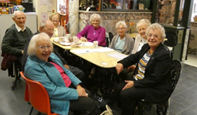
Open Doors Day
The recent Open Doors Day on 25th September saw a steady flow of new visitors as well as plenty of our regulars! Many thanks to all our volunteers who helped make the day a success. Pictured here are two of our youngest volunteers Chloe and Daisy.
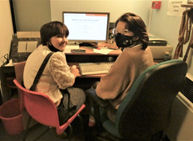
Winterfest / Christmas Fayre
Saturday 4th December 2pm – 8pm
After a break last year, Winterfest is returning to Abertillery on Saturday 4th December and the museum Christmas Fayre will coincide with it as usual. There will be more details of what’s on next month but in the meantime we would be grateful to receive any donations of tins, bottles, chocolate bars, toiletries, bric-a-brac, toys, handicrafts, raffle prizes and items for our Christmas hamper, all of which will be very gratefully received! Please bring to the museum at your earliest convenience.
It is my sad duty to report the passing of a long-standing member, Mrs Kay Webb. We send our condolences to her husband, Graham.
The Trouser Press with links to Concorde!
You may have seen on the news recently that Peter Corby, a RAF veteran, died last month, aged 97. Peter Corby is, of course, the inventor of the Corby Trouser Press. It wasn’t until I heard the news on TV that I realized that the Corby Trouser Press is British through and through. Designed in Britain and made in Britain. It has been the butt of a great many jokes; such as the Alan Partridge sketch where he got bored in a hotel room and dismantled his Trouser Press but, jokes aside, it has been an incredibly successful product; turning up in hotel rooms the world over not to mention as a regular prize on the TV show ‘Bullseye’!
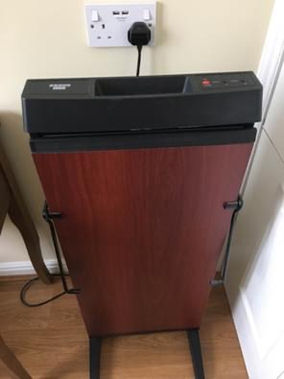
The design was quite simple and has remained unchanged over the decades, the trouser legs are held firmly between two large electrically heated boards, the start button is pressed and 30 minutes later you have trousers with a nice sharp crease down the centre of each leg.
Peter’s father, John, had first produced a mechanical version of the trouser press in the 1930s but it was a chance encounter with a Concorde engineer in the 1960s, and the ensuing conversation, that inspired Peter to add electrically heated boards to the device and the rest, as they say, is history and throughout the 70s and 80s the new electrically heated Corby Trouser Press was flying off the shelves.
However, Corby was not the first electrically heated Trouser press. There is an earlier one and Abertillery museum has one in its archive. The Empire Electric Trouser Presser is thought to date to the 1950s and, unlike the Corby Trouser Press, it is a hand-held device with two small plates that resembles today’s hair straighteners. It is complete with the old style two-pin plug and is in its original box with instructions for use.
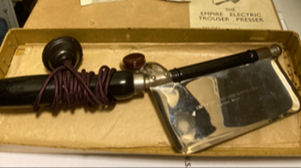
Above, the Museum’s Empire Electric Trouser Press and below the instructions showing a gentleman using the device.
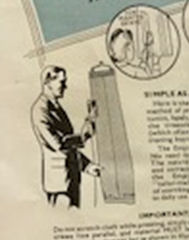 Some time ago I bought my hubby a Corby 3300 Trouser Press (the one pictured in this article) but he always said he could get a better finish himself using an iron. My trousers ended up in it far more than his and in the end I got fed up of it standing unused in the corner of the spare bedroom and gave it to a local charity shop. Given its iconic status, maybe I was a bit hasty…
Some time ago I bought my hubby a Corby 3300 Trouser Press (the one pictured in this article) but he always said he could get a better finish himself using an iron. My trousers ended up in it far more than his and in the end I got fed up of it standing unused in the corner of the spare bedroom and gave it to a local charity shop. Given its iconic status, maybe I was a bit hasty…
Sally Murphy
BARA BRITH
This translates from Welsh as 'speckled bread' and I understand it was traditionally made at the end of the week's bread baking, using left over yeast and the remains of a hot oven. I don't think yeast is used any more, nor is it regarded as a sort of 'leftover' fruit cake but, rather, a cake to be enjoyed in its own right.
Over the years I tried and invariably failed to make a good moist loaf. Until, that is, a friend gave me the following recipe – it hasn't failed me yet. It's a simple recipe in terms of ingredients but the result is invariably a tasty, moreish, moist cake.
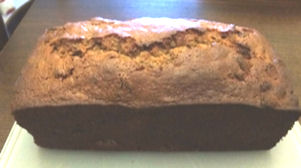
Ingredients
- 12oz cold tea
- 12oz mixed fruit
- 7oz soft brown sugar
- 10oz self raising flour
- 1 egg
Method
- Soak the fruit in the cold tea overnight.
- Mix in the remaining ingredients.
- Cook for 60 -75 minutes at 170ºC [fan oven]
Happy unbaking!
Jen Price
Ebbw Vale Festival Site Update
Following on from my article in August (‘What Might Have Been’), I can now report that, according to a recent report in the Argus, the Festival Park Site has been bought by Mercia Real Estate, who own among other things, the Guildhall Shopping Centre in Stafford. At present though their plans for the Ebbw Vale site are not known. Next year will be the 30th anniversary of the Ebbw Vale Garden Festival and we plan to mark the occasion with the coffee morning postponed from March 2020, so let’s hope we get some good news by then!
IMPERIAL MEASUREMENTS
And in another follow up, this time to my July 2020 article ‘Imperial Versus Metric’* I told how, since the end of 1999, it has been illegal to weigh and sell goods using pounds and ounces. However now that we have left the EU the government is considering repealing that law which means once again market traders will be able to sell a pound of apples without fear of prosecution. And while it has always been legal to sell beer by the pint (in fact it is the only thing that MUST be sold in an imperial measure), the EU banned us from displaying the Crown symbol on our pint glasses, insisting instead on the ‘CE’ stamp. But now the Crown, pictured below, which was first used in 1699 to guarantee the measure of pint and half pint glasses, is also set to return.
Sally Murphy
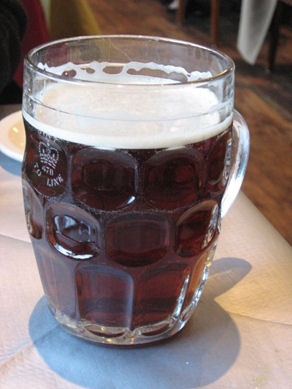
By Jongleur100 - Own work, Public Domain,
*The article ‘Imperial Versus Metric’ is available to read on our website using this link
Daylight Saving Hours
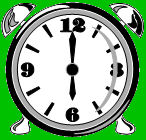 It’s that time of year again; by the end of this month we will all have changed our clocks and wrist watches back to Greenwich Mean Time (GMT). These days it always goes back on the last Sunday in October and goes forward to British Summer Time (BST) on the last Sunday of March though this was not always the case….
It’s that time of year again; by the end of this month we will all have changed our clocks and wrist watches back to Greenwich Mean Time (GMT). These days it always goes back on the last Sunday in October and goes forward to British Summer Time (BST) on the last Sunday of March though this was not always the case….
William Willett was a builder who wanted to make the most of the better weather in the summer months and to this end, in 1907 and at his own expense, he published a leaflet entitled ‘The Waste of Daylight’. He lobbied parliament to introduce more daylight hours during the summer months by moving the clocks. His proposal involved moving the clocks forward by 80 minutes in four, twenty minute increments during April and then reversing it in September. This was deemed too complicated but they did agree that it was a good idea in principle and it resulted in the Summer Time Act 1916. It was first implemented that same year, with the clocks moving forward one hour on 21st May and was put back one hour on 1st October. Unfortunately, Willett died in 1915 so never lived to see his idea put into practice.
This continued until October 1940 when it was decided by Parliament not to put the clocks back. We were at war with Nazi Germany and it was decided we would benefit from longer daylight hours in the evening. So that winter we stayed on British Summer Time until the spring of 1941 when the clocks were put forward another hour resulting in Britain being on British ‘double’ summer time (BDST) ie two hours ahead of GMT with us returning to BST in October. This practice of being on double summer time in the summer and summer time in the winter (you still with me?!) continued until the end of the war. 15th July 1945 saw a return to BST and on 7th October 1945 we finally returned to GMT for the first time since early 1940.
An inquiry in 1966-1967 by the then Harold Wilson led Labour government led to an ‘experiment’. In an attempt to see if road traffic casualties would be reduced, it was decided that Britain would stay on BST all year round. The experiment started on 27th October 1968 and didn’t end until 31st October 1971 after a ‘free vote’ by MPs in the commons on 2nd December 1970 voted to end the experiment. Analysis of the experiment initially showed a reduction in casualties however there had been drink/driving legislation brought in during the experimental period so the results could not be entirely relied on.
Over the years there have been calls for us to stay on BST all year round and others have called for us to move to BDST in the summer. This is referred to as single/double summer time (SDST) and would bring us in line with European countries such as France, Spain and Germany. The problem is that the further north you are, the lighter it is at night and the darker in the morning. In June here in south Wales, it doesn’t get dark until 10pm so with double summer time it would not be dark until 11pm and even later than that in Scotland while in winter the sun would not rise until 10am in Scotland. It can be hard enough to persuade young children to go to bed when it’s still light or to rise when it’s still dark as it is!
And there is a further complication on the horizon. In 2018 the European Council, after a public consultation, proposed ending the seasonal change to the clocks. The European Parliament agreed and planned to end the practice from 2019. However the matter has been delayed, not least because of the pandemic, and it has yet to be passed into law. If it is made law, then every EU member country will be required to choose between summer or winter time and must then remain on that time all year round. As the UK is no longer a member of the EU we will be unaffected and free to continue to change our clocks twice a year, or not, as our government sees fit. However, this would mean that Northern Ireland would find themselves out of step by one hour for half the year with either the rest of Ireland or the UK!
Watch this space!
Sally Murphy
Article sourced from Wikipedia
Top Of Page
